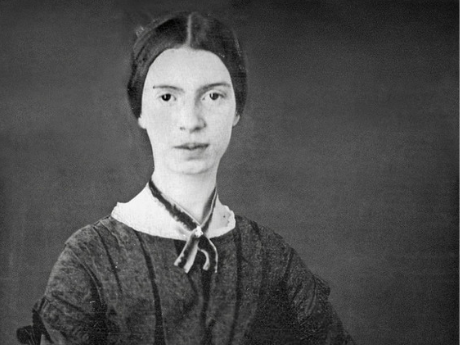Old School
On Emily Dickinson

Sundays this New York City cafe fills up and empties according to the bells that ring from the neighboring church; weekdays according to the cops' schedule. I come here almost every day to work alone in the company of others. These hours get me through the week; they're essential to the sense of discovery and possibility for which I long. But why choose to sit at the table with only books? I often have Beckett with me; sometimes Stevens; always Dickinson, whose familiar face I was surprised to see gazing back at me last July from the shelves of a lovely tiny bookstore in the 20th arrondissement in Paris.
Translated into French by poet Claire Malroux in Une Ame en Incandescence, #777 first caught my eye simply for its insistence on "Loneliness," which is one of my particular eternities (to quote Steve Orlen). "The Loneliness One dare not sound—" is the first line, which is echoed by the opening of the second stanza, "The Loneliness whose worst alarm...." In the third stanza, "The Loneliness" is replaced with "The Horror." Here is the poem in its entirety:
The Loneliness One dare not sound—
And would as soon surmise
As in it's Grave go plumbing
To ascertain the size—
The Loneliness whose worst alarm
Is lest itself should see—
And perish from before itself
For just a scrutiny—
The Horror not to be surveyed—
But skirted in the Dark—
With Consciousness suspended—
And Being under Lock—
I fear me this—is Loneliness—
The Maker of the soul
It's Caverns and it's Corridors
Illuminate—or seal—
Dickinson's poem is an extended definition of a word/world that Malroux, to my initial surprise and dismay, translates as "La Solitude." What the? Solitude isn't loneliness....
But then I remembered the lovely Claire Monin, who teaches French from her home in the tiny island of Ile de Re and who knows a thing or two about both. She told me that the translation of both "lonely" and "alone" is "seule." (Look up "lonely" in the Reverend Walter W. Skeat's etymological dictionary and he'll first direct you to "alone"; from "alone" he'll direct you to "all" and "one." How can a word derived from roots that indicate such wholeness and unity—all for one and one for all!—mean lonely?) And yet voilà—there it is: when I search for "loneliness" in my French/English dictionary, I find, yes, "solitude, noun, feminine" and no better alternatives.
Reading Dickinson in French is a kind of antidote to the agitation, beauty, and confusion so brilliantly aroused by, and housed in, her poems. It's as if I have someone reading along with me, and I can check in with that Other and ask, "Do you hear what I hear? Do you feel what I feel?" (Which is an answerless ontological problem.) And of course we—Malroux and I; you and I—don't hear the same thing: not at all: how could we, given that "[e]very translation begins and ends in failure"? (as Robert and Jean Hollander say in the introduction to their translation of Dante's Inferno). But still, I am both in awe of and comforted by Malroux's achievement; it's like being with a kind and brilliant friend who keeps saying "Oh yes, I know just where you're heading" when you're lost and a little excited about being lost, not at all sure where you've been or where you're heading.
Which is what happened when I read #777 and discovered "Solitude." In English, "Solitude" is a fraction of "Loneliness"; Loneliness debouches into more unknown territories. But Malroux's translation made me stop and think more deeply about the distinction. It also highlighted three additional pleasures essential to the poem, pleasures I might not have enjoyed so deeply had I not been in transcontinental conversation with Dickinson, Malroux, and the angels/demons of translations, wherever they reside.
In English, the poem echoes with "sir": "surmise"; "surveyed"; "ascertain." These repetitions are, to my ear, spiritual echoes, a lone voice calling to "Sir," which of course Dickinson does more directly in other poems (see "'Why do I love' You, sir?") and throughout her letters. There is, as far as I can tell, no similar echo in the French translations. ("Monsieur" is harder to sneak into a word than the monosyllable "sir.")
In both the original and the translation, the absence of personal pronouns in the first three stanzas is radically, expressively broken by the appearance of the "I" ("je" in French) in the final stanza. However, in the original, it's not just one "I" but a doubled first-person followed almost immediately by the first mid-line dash in the poem:
I fear me this—is Loneliness—
In the French, the line opens with less ambiguity as "Voilà"(loosely, "see there"), which is followed by the usual way of saying "I'm afraid of it": j'en ai peur. Without the doubled "I/me," the haunting sense of the-self-scared-of-and-scaring-the-self is absent in the translation.
Malroux's translation helped me get lost in the wonderfully ambiguous syntax of the entire last stanza.
I fear me this—is Loneliness—
The Maker of the soul
It's Caverns and it's Corridors
Illuminate—or seal—
Is "I fear me this—" a sentence on its own, as in, I am scared of loneliness, scared of myself and my depths of terrifying existential alone-ness? This reading could leave the next sentence in the shape of a question:
is Loneliness—
The Maker of the soul
which is territory Dickinson explores again and again in her poems.
Or is the verb "fear" used intransitively, so that the sentence could read "I fear me [that] this—is Loneliness" followed by an appositive, "The Maker of the soul." Do the "Caverns" and the "Corridors" belong to Loneliness? or the soul? or to the Maker of the soul? Who is responsible for their illumination? Does "illuminate" mean to light up, or to come to understand?
Malroux's translation gives the caverns to loneliness, who illuminates—or seals—them. Meanwhile, I've been lying in bed reciting the last stanza to myself, looking for illumination, and am about to go to the cafe and ask Dickinson again, over the din of Spanish music and under the strange sea-blue lights, how to follow her on her unmarked syntactical paths. I don't know what she'll say this time, but I love being in her company.


